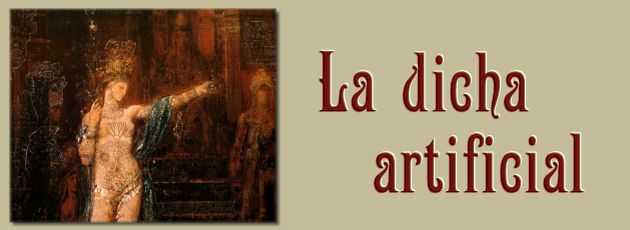
A translation in English of Julián del Casal´s Autobiografía
Oscar Montero, Lehman College, CUNY
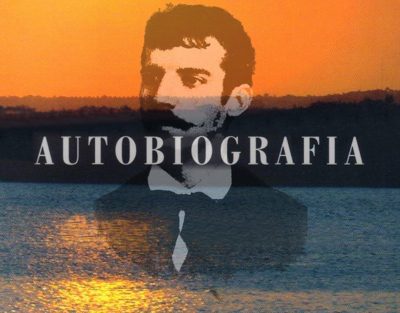 Casal first published “Autobiografía” in La Habana Elegante on March 30, 1890. Shortly thereafter, it appeared with some changes in Casal’s first book of poems, Hojas al viento. The poem is written in hendecasyllables, the Spanish equivalent of the Elizabethan iambic pentameter, a prestigious verse associated with the Spanish Golden Age and much used by Casal and his contemporaries, Spanish American modernistas. It follows the assonant rhyme pattern a-o in all even verses, while the odd ones are in free rhyme. The pattern is unbroken and contributes to the poem’s rhythm and its impact as an aesthetic artifice rather a plaintive, not to say whiny, recounting of life’s hardships.
Casal first published “Autobiografía” in La Habana Elegante on March 30, 1890. Shortly thereafter, it appeared with some changes in Casal’s first book of poems, Hojas al viento. The poem is written in hendecasyllables, the Spanish equivalent of the Elizabethan iambic pentameter, a prestigious verse associated with the Spanish Golden Age and much used by Casal and his contemporaries, Spanish American modernistas. It follows the assonant rhyme pattern a-o in all even verses, while the odd ones are in free rhyme. The pattern is unbroken and contributes to the poem’s rhythm and its impact as an aesthetic artifice rather a plaintive, not to say whiny, recounting of life’s hardships.
The title of the poem evidently suggests a personal account of lived experiences, but it should be noted that it is a lyrical not a real autobiography. Far from being realistic it rather presents a deliberately archaic allegory of the stages of the poet’s life, reminiscent of the pre-Raphaelite fascination with medieval iconography. The explicit declaration of origin and identity (“I was born in Cuba”) presents a sharp contrast with the pilgrimage that follows, theatrical in its imagery and grand and melodramatic in its gestures.
Casal’s later work offers richer, more innovative imagery, less predictable contrasts and the mastery of language that put him at the forefront of modernismo. Yet “Autobiografía” set the stage for what was to come: the representation of lived experiences in the theatre of an ornate, opulent language. Casal was twenty-six years old when he wrote it.
I have made no attempt to follow the original pattern of versification but have tried to give a sense of the poem’s rhythm and of the impact of its imagery. I have preferred to offer a literal translation and leave to others perhaps a more lyrical version. The original poem in Spanish follows my translation.
Autobiography
by Julián del Casal
I was born in Cuba. My pace swift
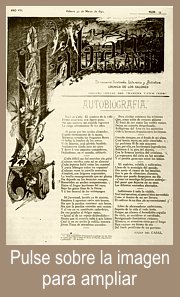 and firm, I walk life’s byways,
and firm, I walk life’s byways,
the heavy load of years not yet
stooping my vigorous shoulders.
Passing through green promenades,
my hand tenderly held,
I cut fragrant flowers
or drank in the light of stars.
Then I saw Death, a treacherous thief,
swiftly pouncing before me,
wounding my beloved companions,
leaving me alone in the world.
How difficult it was to walk without a guide!
How many obstacles rose before me!
How rough I found every single hill!
And how dark every single space!
How many times the morning star
cast its silvery rays,
on the bloody tracks left by my feet
in the deserted fields, traversed
in stormy nights,
under the icy drops of rain,
the thunder’s frightful roar
and lighting’s deathly glow!
My youth, mortally wounded now,
begins to die in my arms,
my kisses not reviving her,
my songs giving her no comfort.
And seeing, in her cadaverous mien
the waning light in her eyes
– like the reflection on a faded mirror –.
I feel my heart rising to my lips,
as if a young titan with steely limbs
were burying his knee upon my chest.
Thus to forget all this sadness
that, as a cloud of avid birds
devours a golden fruit amid the verdant branches,
leaves my own heart in pieces,
I take refuge in the mysteries of Art
or in the arms of lovely Aspasia.
I keep forever, in the depths of my soul,
like the holy host in its chiseled chalice,
the purest faith of my elders,
who in legendary times, climbed
the sacrificial pyre for its cause,
with the heroic purpose of old Christians,
the hope of heaven in their eyes
and generous forgiveness on their lips.
My spirit, fickle and sickly,
full of nostalgia for the past,
now longs for the clamor of battle;
now for the peace of silent cloisters,
until the day it might rid itself
– like a beggar at last tossing off his rags –
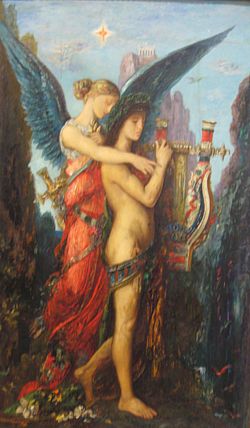 of the sorrow left in its heart
of the sorrow left in its heart
by dead, aborted dreams.
Indifferent to all that is visible,
neither evil attracts me,
nor good holds me enraptured,
as if inside of me I carried
the corpse of a God, my enthusiasm!
Free from the burden of ambitions,
I carry life´s heavy load,
because I thrive in the formidable pride
of living, neither envious nor envied,
chasing after fantastic visions,
while others drag themselves through the mud
to extract a mere atom of gold
from the pestilent depths of a mire.
Autobiografía
Julián del Casal
Nací en Cuba. El sendero de la vida
firme atravieso, con ligero paso.
sin que encorve mi espalda vigorosa
la carga abrumadora de los años.
Al pasar por las verdes alamedas,
cogido tiernamente de la mano,
mientras cortaba las fragantes flores
o bebía la lumbre de los astros,
vi la Muerte, cual pérfido bandido,
abalanzarse rauda ante mi paso
y herir a mis amantes compañeros,
dejándome, en el mundo, solitario.
¡Cuán difícil me fue marchar sin guía!
¡Cuántos escollos ante mí se alzaron!
¡Cuán ásperas hallé todas las cuestas!
Y ¡cuán lóbregos todos los espacios!
¡Cuántas veces la estrella matutina
alumbró, con fulgores argentados,
la huella ensangrentada que mi planta
iba dejando, en los desiertos campos,
recorridos en noches tormentosas,
entre el fragor horrísono del rayo,
bajo las gotas frías de la lluvia
y a la luz funeral de los relámpagos!
Mi juventud, herida ya de muerte,
empieza a agonizar entre mis brazos.
sin que la puedan reanimar mis besos,
sin que la puedan consolar mis cantos.
Y al ver, en su semblante cadavérico,
de sus pupilas el fulgor opaco
-igual al de un espejo desbruñido-,
siento que el corazón sube a mis labios,
cual si en mi pecho la rodilla hincara
joven titán de miembros acerados.
Para olvidar entonces las tristezas
que como nube de voraces pájaros
al fruto de oro entre las verdes ramas,
dejan mi corazón despedazado,
refúgiome del Arte en los misterios
o de la hermosa Aspasia entre los brazos,
Guardo siempre, en el fondo de mi alma,
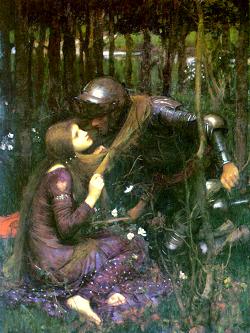 cual hostia blanca en cáliz cincelado,
cual hostia blanca en cáliz cincelado,
la purísima fe de mis mayores,
que por ella, en los tiempos legendarios,
subieron a la pira del martirio,
con su firmeza heroica de cristianos,
la esperanza del cielo en las miradas
y el perdón generoso entre los labios.
Mi espíritu, voluble y enfermizo,
lleno de la nostalgia del pasado,
ora ansia el rumor de las batallas,
ora la paz de silencioso claustro,
hasta que pueda despojarse un día
-como un mendigo del postrer andrajo-,
del pesar que dejaron en su seno
los difuntos ensueños abortados.
Indiferente a todo lo visible,
ni el mal me atrae, ni ante el bien me extasio,
como si dentro de mi ser llevara
el cadáver de un Dios, ¡de mi entusiasmo!
Libre de abrumadoras ambiciones,
soporto de la vida el rudo fardo,
porque me alienta el formidable orgullo
de vivir, ni envidioso ni envidiado,
persiguiendo fantásticas visiones,
mientras se arrastran otros por el fango
para extraer un átomo de oro
del fondo pestilente de un pantano.(1)
1. The Poetry of Julián del Casal: A Critical Edition. Ed. Robert Jay Glickman. Gainesville, FL.: The University Presses of Florida, 1976. I have translated the poem as it appears in the first volume of this edition (7-9) and have used the commentaries in the second volume (23-26). My friend Ana Diz offered many corrections and suggestions, which I have incorporated in the translation.

